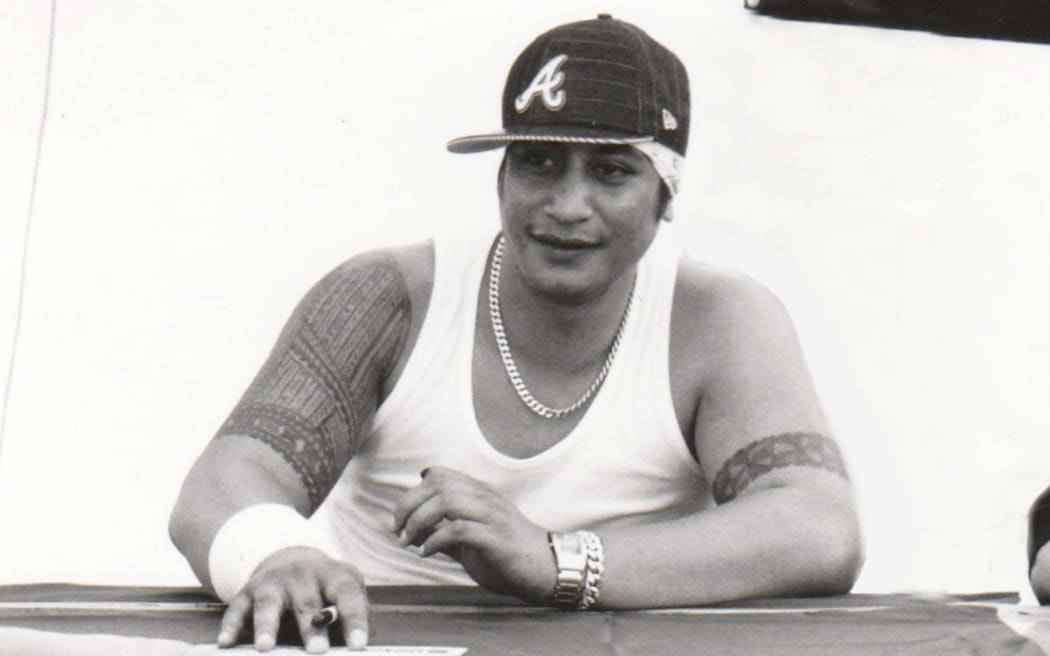Opinion - Since March last year, Scribe has featured in articles at least a dozen times - more than one article per month - despite his alleged crimes being minor and it having been ten years since his last album.

Scribe signing autographs in 2005. Photo: Gareth Shute
Back in 2011, Scribe (real name Malo Ioane Luafutu) fronted up on John Campbell’s television show to explain himself. His personal problems had been devastating - three family members had died the previous year and his partner had left him, taking their children with her to Australia (though they later reconciled).
He admitted his ongoing problems with heavy-drinking, drugs, and gambling had led him to pawn his music awards, though he’d struggled to get them back after the pawnbroker put them on TradeMe and the prices skyrocketed.
In those days, Scribe was still a household name - his debut album, The Crusader (2004) had gone five times platinum in New Zealand (over 75,000 units sold), and went gold in Australia (over 35,000 units sold).
His second album (in 2007) struggled to match it, reaching the still-respectable level of gold sales in New Zealand, though this fall may have partly reflected a wider decline - local industry body, Recorded Music, reported that between 2001 and 2014, their revenue nearly halved from $120m to $66m.
Given Scribe’s declining career success and his tenuous personal situation, you may have thought that the local media would’ve taken a step back at this point. After all, here was a person with addiction issues, who had admitted his life was falling apart.

Scribe Photo: Audioculture
Yet the articles kept coming - mostly on Stuff (although RNZ has also run a couple of court reports), because it had reporters in Scribe's hometown of Christchurch.
The reports covered events that wouldn’t have made the papers unless a celebrity was involved - like the time he was held in the cells overnight by police in Wellington for free-styling on the streets (his raps included anti-cop rhetoric) or when he made a mocking tweet about Jesse Ryder being assaulted (the link is no longer online - The Press 2013 Apr. 1, p. A1).
Occasionally, there would be articles about the positive things Scribe was doing - the critically lauded play that he wrote with his cousin Oscar Kightley, his impressive appearance at the Silver Scroll Awards (in 2013), or a surprise appearance at a festival. However, when you count them up, the negative stories far outweigh the positive ones.
Despite Scribe’s not having released an album since 2007, the articles kept coming - reaching a bizarre fever pitch over the last year as he was brought before the courts and given a two month sentence for breaching bail.
At this point, the question has to be asked - do his crimes really justify monthly main page headlines on our biggest news sites?
Scribe is now reported on like a celebrity in a gossip magazine. His every move is part of a media narrative that has developed around him - a story that readers follow like fiction, taking interest in each new development without caring about the person behind them.
A recent podcast from Slate looked at how celebrities often become stuck in a moment because the gossip magazines benefit from portraying their life as updates on the same story (in particular, they looked how Jennifer Aniston is constantly portrayed as the sad ex-partner of Brad Pitt, despite her many subsequent successes).

The media crusade against Scribe Photo: Tony Stamp
And what is the story that the media are telling about Scribe? It is the classic story of a successful artist fallen on hard times.
Every misstep provides another detail for the unfolding saga. No wonder these articles are always run with the worst photo possible of him - running from the courtroom or looking slightly dishevelled at the dock.
The fact that there is a real person behind the headlines isn’t acknowledged. Nor does “successful” in a local context mean what it does overseas.
The sad truth is that being a successful musician (or actor, or novelist, etc) in New Zealand often means making a decent amount of money for only a short period of time and then falling back down to earth with a bang.
We treat our stars like international celebrities, but they don’t receive the same income and don’t have the same protection from our prying eyes (no full-time manager, no bodyguards).
If they come from a working-class background, then they also are unlikely to get advice on how to carefully invest their money when it does come.
As David Dallas says in his track ‘Hood Country Club’: “think of pro-athletes with no management get money, we just never taught to handle it, spot up shooter we never taught to handle it, just sign here, 25% per annum shit’. How else could you explain how one of the biggest musical success stories ever, Pauly Fuemana (from OMC) ended up losing his house in a mortgagee sale?
Stereotypes about rap music also play into the coverage. Rock bands fare a lot better - Hello Sailor’s Ponsonby house saw so much drug use they dubbed it ‘Mandrax Mansion’ and they also wrote an ode to heroin, but in the newspapers it’s remembered in a wistful fashion while darker truths about the band’s lead singer are covered in the briefest detail possible.
Then there’s Dragon who are called ‘legendary’ and ‘iconic’, with no mention of the two band members who died of drug overdoses and the song they wrote about an ex-con wanting to sleep with a girl who looked underage.
The headlines are far less salacious when they cover singer Rick Bryant being jailed for two years for selling marijuana and having in his possession cocaine and ecstasy - he's even still referred to as a “rock legend”, while the far more successful Scribe is simply named as a "hip hop artist".
The difference in the way they are treated is stark.
hey, @NZStuff: new zealand has a giant problem with suicide, and you do a sort of "joke" post using old lyrics from the person you are referencing. you realise this is a human, right? at no point does someone become so much a part of pop culture that this becomes OK. it's not. pic.twitter.com/UgSrtRBs2e
— David Farrier (@davidfarrier) January 25, 2019
– Journalist David Farrier criticizes Stuff for joking about Scribe and suicide. The original Stuff Tweet came from one of their reader's comments.
In January, Scribe spoke in depth to Newshub about how the last few years had left him suicidal and his desire to finally turn over a new leaf. The information of his misdeeds was still given but without the degrading photos of him in court or the need for a salacious headline.
It has yet to be seen whether Scribe can free himself of his addictions and get his music career back on track, but perhaps we don’t need to follow every moment of his trials and tribulations.
After all, the reason why the news-sites keep running stories about Scribe is because readers keep clicking on them.
So how about this - why don’t we all do him a favour and scroll past those monthly reports on his troubles and check in with him when he is ready to become a public figure again.

